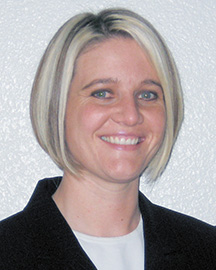Q&A
Futures For You

Inside The Futures World
Want to find out how the futures markets really work?
DeCarley Trading senior analyst and broker Carley Garner responds to your questions
about today’s futures markets. To submit a question, post your question
at https://Message-Boards.Traders.com. Answers will be posted there, and selected questions will appear in a future issue of S&C. Visit Garner at www.DeCarleyTrading.com. Her books Currency Trading In The Forex And Futures Markets; Commodity Options; and A Trader’s First Book On Commodities, are available from FT Press.
WHAT’S A TYPICAL COMMISSION?
What kind of commission is typically charged to trade futures and options online or with a broker?
Before you can look at commission rates objectively, you must understand the background of the futures industry. In recent years, advances in technology have brought the futures and options markets closer to the average retail trader. Because of electronic trading, futures brokerage firms now implement tighter risk management techniques in their quest to prevent traders from losing more money than they have on deposit. Not only that, brokers are now willing to accept clients with much smaller account balances; charge less commission for their services; and offer market access with less interference from risk management teams.
In general, all this is a positive because it provides a broader range of product choices to those who otherwise wouldn’t have ventured into leveraged trading.
Although technology has worked wonders for trading volume and therefore revenue generated on domestic futures exchanges, it hasn’t necessarily improved the ability for brokerage firms and brokers to make a living. After all, exchange transaction fees go directly to the exchange and don’t benefit futures brokerage firms; in addition, futures brokers have lowered commissions to the point that profit margins are slim. In fact, some brokerage firms are operating on models that leave little or no profit incentive despite massive trading volume. As a result, they may operate prop trading desks or invest in risky assets to make up the difference (think MF Global).
Even worse, highly discounted commissions and low barriers to enter the futures markets are the equivalent of penny machines in a casino in a poverty-stricken neighborhood. It enables those who might not have the financial means, trading experience, or market knowledge to participate in a no-mercy, high-stakes game, often with unfortunate results.
A “fair” commission rate depends on the level of service provided, the size of the trading account, and volume.Sadly, in contrast to many assumptions, the dramatic improvements in information flow and convenient technical analysis have failed to improve the odds of success. Roughly 70% to 80% of traders lose money in the markets, and my guess is that for those in their first year or two, the odds are much higher.
Too many beginning traders are not prepared for the challenges they will face in speculation. Thanks to easy access to leverage, along with speedy fundamental and technical analysis tools, novices often fall victim to the idea that successful trading is as easy as buying the right software, subscribing to a datafeed, and finding the cheapest commission rate available, which often entails self-directed online trading.
Such an arrangement might be ideal for experienced traders, but for those unaccustomed to trading symbols, order types, market hours, market liquidity, or other basic factors, trading online might be a synonym for shredding money.
Traders are being “coached” into a mindset of saving money, rather than making money; what they don’t realize is they will get what they pay for. In the end, many novices opting for a highly discounted commission rate, in lieu of quality service and guidance, pay thousands to the market in painful lessons.
I cannot necessarily provide nominal figures about what a “fair” commission rate is because, frankly, it should depend on the level of service provided, the size of the trading account, and volume. That said, beware of firms that offer blanket commission rates because there is no such thing as one-size-fits-all when it comes to brokerage. After all, you wouldn’t want to be involved with an insurance company that offers flat rates because it would entail low-risk clients subsidizing higher-risk clients, and brokerage services are no different.
What I can tell you is that being privy to an experienced brokerage staff can be effective in shortening the learning curve for newbie traders. Trading with a full-service brokerage that offers quality service, market research, and support can do wonders for the bottom lines of inexperienced traders. In other words, commission should be looked at as an investment rather than a cost. If you are saving money in commission costs by trading with a discount firm but are consistently losing money, then you aren’t doing yourself any favors.
Look at things logically: A single unit move in most futures markets typically far outweigh a few dollars in commission. Specifically, one tick in Treasury futures is equal to $31.25 or one penny in grains, and silver is equal to $50 and one handle in the emini S&P is $50.
So do you think paying a dollar or two more in commission to be trading with a quality firm will be the determining factor in your success? If the brokerage saves you one tick in your entry via quality research, support, or a shortened learning curve, you are already ahead of the game!